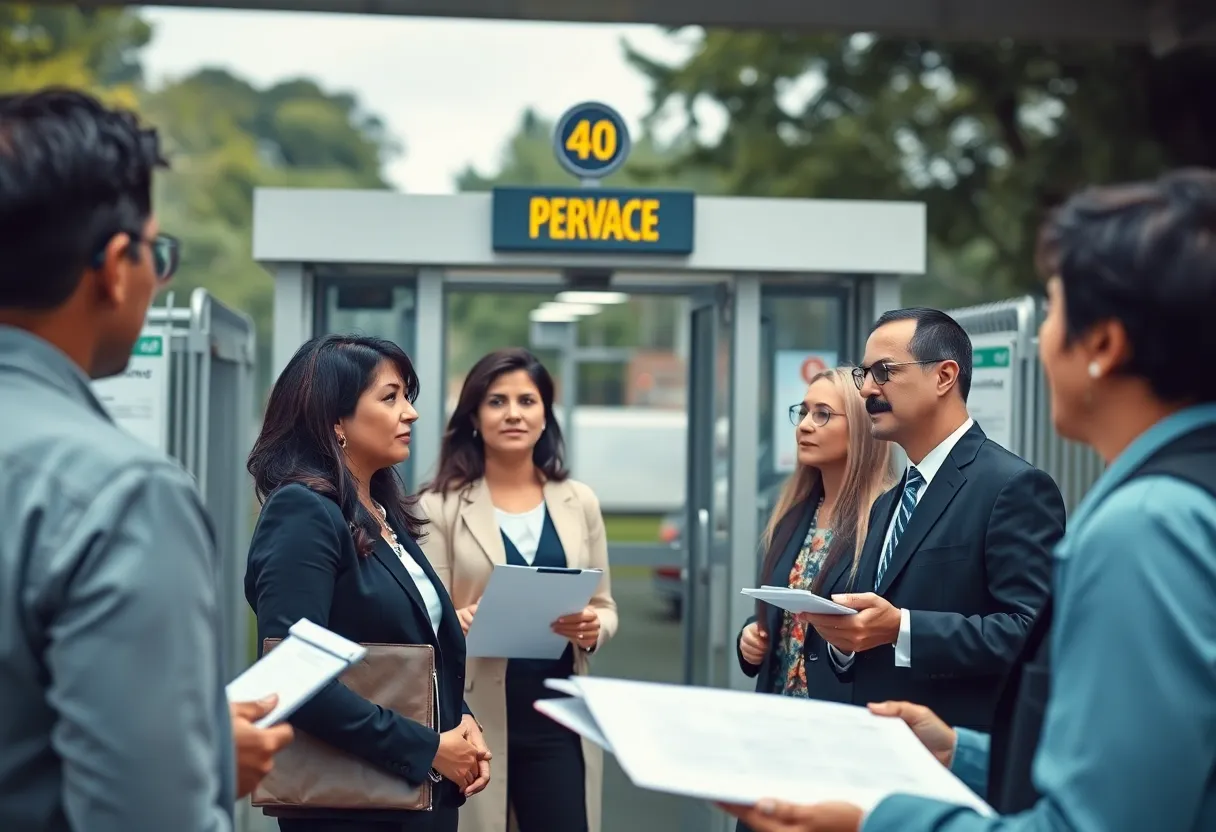

Lawyers engaged in conversation about privacy rights and border control.
Amir Makled, a Lebanese American attorney, experienced an unsettling border stop upon returning from vacation, subject to invasive scrutiny by Customs and Border Protection. His encounter raises questions about privacy rights and government surveillance, particularly for legal professionals involved in controversial cases. The incident underscores broader concerns over the erosion of Fourth Amendment protections at U.S. borders and the potential for intimidation faced by those who represent marginalized clients.
Amir Makled, a Lebanese American attorney based in Detroit, faced an unsettling experience upon returning from a family vacation in the Dominican Republic. Known for representing high-profile cases, including a pro-Palestinian student activist arrested during a protest at the University of Michigan, Makled found himself subjected to the relentless scrutiny of the Customs and Border Protection (CBP) upon arriving at Detroit Metro Airport.
The incident began when an immigration official scanned Makled’s passport and requested the assistance of a Tactical Terrorism Response Team (TTRT) agent. It was a moment filled with anxiety, as Makled sensed he was being targeted, not randomly, but perhaps due to his Arab ethnicity and the controversial cases he handles. These apprehensions were exacerbated by the ongoing trend of the Trump administration’s targeting of individuals protesting against Israel’s policies in Gaza.
Unlike the usual random stops often faced by Muslim and Arab Americans, this experience felt alarmingly deliberate. The immigration officers appeared fully aware of Makled’s profession and his connections to contentious legal matters, raising questions about the motivations behind the stop.
During the stop, Makled experienced first-hand the recent trend of CBP officers conducting detailed searches of phones at US borders, a practice increasingly normalized under current case law. Unlike typical legal searches that require warrants, the border context allows for seemingly limitless surveillance, which Makled found troubling.
The officers did not provide him with a clear explanation for the stop or clarify what they were looking for. Instead, they presented Makled with a stark ultimatum: unlock his phone voluntarily or face potential confiscation for examination.
Makled, understanding the legal ramifications and the nature of his communications, stood firm in his refusal to disclose any privileged information stored on his device. Additionally, he declined to provide a written list of privileged contacts, which led to further scrutiny from the agents. Although a supervisor was brought in, the agents made their intentions clear—they could confiscate Makled’s device unless he complied.
Faced with the risk of losing his primary tool for client communication, Makled reluctantly complied and unlocked his phone. Following that, the agents conducted a search of his contacts and inquired about specific names, further intensifying the invasive nature of their investigation.
After approximately two hours of questioning, Makled was released, although he was informed that future travels might result in additional stops. In a notable twist, CBP described his ordeal as a routine secondary inspection and asserted that he consented to a limited search. This assertion has drawn vehement criticism from Makled and legal experts alike, who denounce it as “blatantly false and sensationalized.”
Sophia Cope from the Electronic Frontier Foundation raised her voice against the legality of such phone searches, highlighting that CBP possesses broad authority to halt both citizens and non-citizens based on security concerns, even while acknowledging that they must ultimately allow U.S. citizens entry.
Expert opinions suggest that Makled’s encounter might have been premeditated, influenced by his legal work and affiliations that flag individuals for closer examination. This situation has sparked considerable concern about government surveillance overreach and its implications for privacy rights at borders.
Notably, Canadian citizens have also received warnings concerning increased scrutiny and potential searches of electronic devices when crossing into the U.S., a reflection of escalating tensions in Canadian-American relations under current administration policies.
This incident underscores a broader pattern of intimidation faced by attorneys and advocates representing controversial clients. The Fourth Amendment, crucial for privacy protection, is viewed through a different lens at the borders, essentially diluting traditional privacy rights and heightening the risk for those traveling with sensitive information.
In conclusion, Makled’s harrowing experience stands as a stark reminder of the precarious intersection of national security and individual rights, prompting a need for urgent dialogue about the significance of privacy, especially in the context of legal representation and the rights of citizens against unwarranted government inquiry.
Lawyer Detained After Family Trip Raises Concerns
Lawyer Services for Migrant Children Halted by Administration
News Summary The Carolina Forest wildfire has impacted over 2,000 acres in South Carolina, with…
News Summary Columbia, SC is bracing for a significant winter storm bringing wintry temperatures and…
News Summary Frasers Property is making a renewed effort to privatize its real estate investment…
News Summary Authorities in Florence County have charged two women in connection with the tragic…
News Summary The Center for Asbestos Related Disease (CARD) clinic in Libby, Montana, has shut…
News Summary Johnson & Johnson faces an overwhelming number of lawsuits related to its talcum…